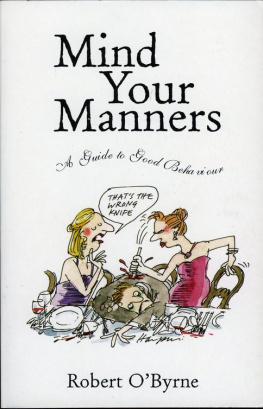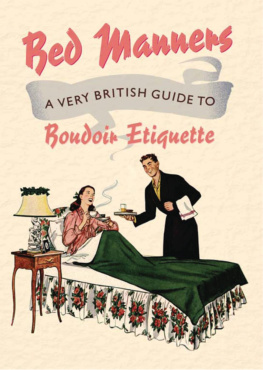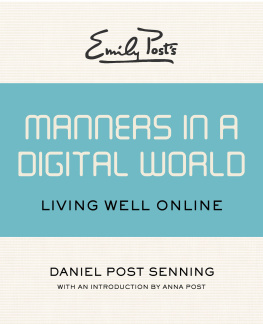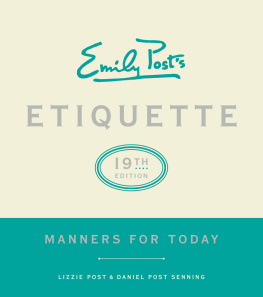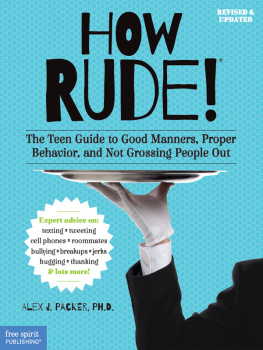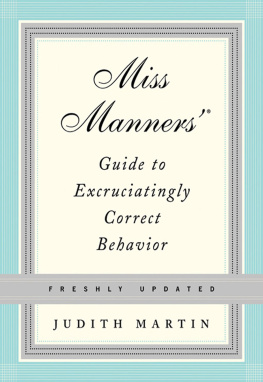
Introduction
Nobodys Perfect
Im not here to preach. This book isnt about transporting you back to a 1950s dinner party on the Upper East Side. Im not trying to drain your life of fun or lecture about which fork to use. The subject here is not seated dinners or when its all right to eat sushi with your fingers (always permissible, as it happens). Manners may have once been how the upper classes recognized one of their own, about who was a knowledgeable insider and who was not. Thats no longer the case.
Good manners are not relegated to town houses above the fray or for social climbers getting into country clubs. Rather, manners today are immediate and downright democratic. Theyre about showing fundamental decency to the people you come across every day: waiters, taxi drivers, flight attendants, strangers you meet only once.
Are certain rules helpful to know? Of course they are, and some of those enduring rules truly matter. Ideally, youll be confident and gracious regardless of the setting, and knowing rules, and how to interpret them, puts you at ease and helps you present the best version of yourself. But some long-standing rules are really more like guidelines, and if you know them well then you know when they can be bent or even broken. But acknowledging they exist remains importanttheres no civility without customs. Its easy to obsess over details, but it can be clarifying to pull back and ask one question above all: Do you try to make the lives of people around you easier?
That informs everything else. Do you give up a seat before being asked? Lend a hand? Tip well? Toast well? Listen attentively? Turn the other cheek? Make eye contact? Do you have a sense of your place in the world and your impact on others? If you have that general sensitivity then everything else falls into line. You wont conduct a phone conversation at full volume in a quiet train car. You wont prop your bare feet in public view as if you were on the beach. You wont be proudly underdressed and mistake that for a sign of authenticity. You wont text unwanted photos to a woman at 2am (or 2pm for that matter).
With everything going on in the world, it seems like a particularly good time to assess how to be a better man. Manners are now, and have always been, about making society run more smoothly. Maybe thats why theres a sense that something is missing in the culture today, that sense of civility that asks nothing in return. Too often weve convinced ourselves that to get ahead we need to take advantage of every angle. But witnessing bad behaviorin person, on television, in politicsdoes not excuse your own. Rather, each of us should strive to be the exception. The world may seem crazy, but thats all the more reason to be the patient, well-dressed man on the plane who doesnt throw elbows trying to get to the overhead bin.
We learn more about the world as we navigate our way through it. Thats called wisdom. Its something to aspire to, and like everything worth having, it cant happen all at once. But some of the simplest rules we learned as children. And thinking of others, listening to them, basic as it sounds, is one of the animating rules of civilized life, and it endures for good reason. Manners are part of our lives whether we like it or not. Curiously, those who claim they dont care about them discover they can be quite defensive when called out.
Writing about manners is a delicate matter. Most books on the topic, as you would expect, have a certain formality. Some are out of date; others remain timeless. Tiffanys Table Manners for Teenagers is worth anybodys attention at any age. Published in 1961, it imparts a sense of propriety but also a reminder that socializing, even when sitting around a table with a starched white tablecloth, is meant to be enjoyed. It recognized our humanity, including our mistakes, which is why it dealt with spilling wine and the untimely hiccup (though perhaps all hiccups are untimely). Ultimately, that book taught young people how to behave at a dinner party, and thats still a useful thing. That, however, is not the mission of this book. This book isnt about archaic rules that inspire dread but about asking more of ourselves and trying to do the better thing in real-life situations.
How did I get in this position, you ask? Who am I to judge? Did I study to be a butler? Have I even met one? Well, first of all, I dont claim to be the ultimate arbiter, eager to shake my head at some lack of decorum. But I am fascinated by behavior and dress and customs, both in America and abroad. Ive written about culture, manners and the nuances of society for years. Looking back, I realize that one of my primary considerationshow men dressis not just about clothes. Its really about being in public, how we fit into the world and how we show respect to others. Which, of course, sounds a lot like manners. All these things are connected. Which is why Im fascinated by what people wear to the opera but also how they treat a matre d or how they serve food at a party.
Im confident enough to say that yes, you need a suit, and should be comfortable in one, even if you wear it only once a year. There are other things you learn through curiosity, travel and just living in the world. Manners are the guidelines of a civilized life. How you interpret those rules describes the contour of your personality. I certainly dont claim to be perfect: Ive gotten in arguments with girlfriends in public (never a good look), stormed out of restaurants (also: not good). For various reasons, Ive had to apologize to friends, bartenders and the CEO of the company where I worked.
In the course of my ongoing education, Ive discovered that Japan is a good place to repeatedly make a fool of yourself and Ive done so. It is possible to use the wrong chopsticks, particularly if theyre for condiments that youve mistaken for an appetizer. (This is a... strong taste.)
Yes, you tend to remember fiascos that become good stories over time. In New York I was at a black-tie affair, sat down and took what I thought was my napkin from the table. It turned out it belonged to my neighbor, a woman of a certain age who was about to be seated next to me. I realized my mistake and tried to lighten the mood by saying, I believe this belongs to you, Madame, and theatrically presenting it to her, like a French waiter. This effort at levity was not well received. She raised an eyebrow and understandably turned away from me for the rest of dinner.
If a lot has changed since formal dinner parties, then some things have not. But technology, as a whole, has certainly altered the equation. Too easily we treat every public space as our own mobile office, catching up at full volume with friends, FaceTime-ing in the middle of restaurants, conducting meetings in outdoor voices.
So much is in flux these days, with shocking revelations of bad behavior coming out seemingly every day. Understandably a man asks himself how he fits into the world. Is it chivalrous or behind the times to pay for dinner on a first date? Who orders wine when shes the expert? Are we holding doors? Double-kissing strangers? What if theyre European? We want to be sensitive, enlightened and masculine all at once.
These are questions worth asking, and I try to answer some of them in these pages. I also asked some interesting men I know what they thought about the state of play today. What does designer Todd Snyder make of the way we dress? What does the brilliant bartender Jim Meehan think of patrons on the rail? There are insights here from editors, restaurant owners, creative directors (real ones with actual jobs), behavioral scientists whove studied dating, stationers who remind you to write your mother. They tell stories, ask questions, give advice, reveal their peeves, go on an occasional rant. Were in this together, and were trying to find out which rules still apply and which dont.
Next page


